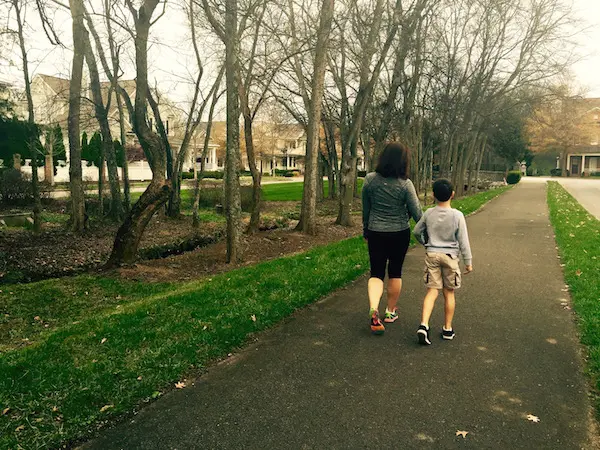Black Friday… that mad, post Thanksgiving rush to buy items that you had no idea you even needed 30 days ago. Hurry, hurry, hurry. Buy, buy, buy. I saw it all over town and TV today, right down to the viral video of two “jolly shoppers” fighting over a bargain in a suburban Minnesota mall. It all just screams love and joy and good times, doesn’t it? And doesn’t it also set quite the example for our children? The mad rush to obtain material goods at the expense of others. Well… I have two words for you… SLOW DOWN! Here is how you can join the slow parenting movement.
“Slow parenting” is a term that emerged in response to the fast-paced, hectic lifestyles that many families experience in modern society. It encourages parents to take a more mindful and deliberate approach to parenting, emphasizing quality over quantity in terms of time spent with children. The concept is inspired by the broader “slow living” movement, which promotes a slower, more intentional way of life.

What Is Slow Parenting?
Have you heard about the (somewhat) new slow movement? It is based on the idea that modern life is moving at a super fast pace leaving us with not free time and do time to truly connect with others. So what is Slow Parenting? It is exactly what it sounds like. Slowing down our lives, and the lives of our children, so we can actually smell the roses – instead of just buying them as we rush out of the grocery store.
Slow parenting isn’t about less work or doing nothing. It actually can be more work because you have to be thoughtful by being proactive – instead of reactive. It’s about setting rules that family and family time are treasured and come first, and then sticking to those rules. It’s the idea of slowing down long enough to actually ask the question… “Do we like what we are doing and how we are doing it?”
Sounds simple and easy, right? Maybe, maybe not. Paring down to the essentials means making hard choices. It can mean going against the grain when everyone else’s kid is doing multiple after school activities and you and your child have chosen one after school activity or none. (I often struggle with over-scheduling personally). Slow parenting requires you to get over the notion that you or your child is “missing out” on something. Ultimately, whatever that something is, with slow parenting you’re gaining something else – precious and quality time together.
How To Start Slow Parenting
Want to S – L – O – W down? Try these key principles to get you headed (like a turtle) in the right direction…

Make A Family Calendar
Plan a weekly family meeting to go over the calendar for each week. If it goes on the calendar, it should be important. Consider every after school activity, every birthday party invite, every club, every sport, every extracurricular activity and then consider what they all will do to your time together. Most importantly, don’t forget to actually write in family time – and write it in Sharpie so it can’t be changed! Also, try to leave one weekend day completely empty to allow for doing whatever comes up in the course of the day. No schedule, all fun!
Activities That Matter
Truly think about what matters in the long run. Think about if that three day a week commitment for baseball is actually worth it or if you would be better served by simply playing baseball in the backyard as a family. Instead of trying to cram numerous activities into a day, slow parenting suggests focusing on meaningful, quality time spent with children. This could involve activities that promote bonding, communication, and shared experiences.
Parents feel a lot of pressure to provide extra activities, like music lessons and basketball teams, when instead everyone might just be better off simply doing it together. I played organized baseball for years growing up but the best memories I have are not of championship teams but instead of playing ball at dusk with my father in the field behind our house. I can’t tell you anything about a specific season of organized ball but I can recall every detail of those summer nights with my dad.
Let your children try a lot of different things until they find their interests – so they are not feeling tied down to one interest. Let them try things one thing at a time, and if they don’t like it, let them move on. This is not about quitting this is about finding real and genuine enjoyment and interests.
Leave Time For Unstructured Play
Allowing children to engage in unstructured, free play is a central aspect of slow parenting. This type of play encourages creativity, problem-solving, and independence.
Declutter
We live in houses filled with stuff, and a lot of it is stuff that we probably never use or need. All that stuff can become overwhelming – literally and mentally. Once you’ve decluttered the calendar, tackle the toy bins and then the closets. Then maybe start reducing the clutter in the garage and the attic, and the home office. See how many meals you can make out of your pantry. Find things to do with your family that you may have even forgotten you even had. Simply your life and simplify your time together.
Mindful Presence
Slow parenting encourages parents to be fully present and engaged when spending time with their children. This means putting away distractions, such as smartphones or work-related concerns, and focusing on the present moment. Rather than rushing to do everything for their children, slow parenting encourages parents to involve their children in daily tasks and teach them essential life skills. This can include cooking, cleaning, and other practical activities.
Balanced Technology Use
Slow parenting suggests being mindful of the role of technology in family life. This may involve setting limits on screen time and encouraging more face-to-face interaction.
Build Your Tribe
It takes a village, really it does. Surround yourself with other parents and friends who have similar interests and outlooks.
Try simple things like finding families who have similar tastes in food and taking turns with a night to cook for the other families. Or even simplify it down to a pot luck pitch in. Build up a group of friends to hang out with and lean on when your tank is empty and you need an emotional refill. Organize play dates and get togethers with similar people who can support your desire to slow down and do things a little outside the box.

Don’t Miss Precious Opportunities To Create Positive Childhood Memories
While walking my son to school today, I couldn’t help but overhear the conversation going on on the sidewalk behind me. I never turned to look but I could gather that it was a mom and her two daughters also walking to school. They were probably 30 feet away but I could hear them clear enough that the two minute snippet of sound made me sad, mad, proud, and grateful all at the same time. It brought to mind the importance giving our children our time and presence and creating positive childhood memories.
The girls were asking their mom to walk them all the way to the doors of the school. Actually they were almost begging mom to do so. However mom just kept replying that she couldn’t because she had to get to work. She finally told them that she would go as far as the bike rack but that was all. Let me paint the picture for you here.
The bike rack is approximately 100 feet from the actual school doors. Mom was not willing to go that far. The girls were disappointed to say the least. I still didn’t turn around as my son and I passed the bike rack but I am assuming that mom was long gone and headed back to her car because I heard one of the girls yell out “bye mom, I love you!’ Out of curiosity, I timed the extra distance and it took me three extra minutes – which included a goodbye hug and kiss with my son. At this point I got sad. I thought what a pity that this mother lost a few precious minutes of morning time with her daughters.
Yes, I am sure that she was pressed for time and her work was, and should be, a priority but honestly, it was 100 feet. 100 feet that seemed to mean the world to two elementary school girls on this morning.
Conclusion
Be in the present. It truly is a gift and kids grow so fast!
The goal of slow parenting is to create a more relaxed and nurturing environment for both parents and children. It’s about fostering a deeper connection and allowing children the time and space they need to develop at their own pace. However, it’s important to note that slow parenting doesn’t mean neglecting responsibilities or failing to provide structure; rather, it encourages a balanced and intentional approach to parenting.
Slowing down, with parenting and with life, can be a huge improvement on your world. Physically, mentally, and parenting wise. Try it for a month or two and see what happens. Enjoy breakfast a few minutes longer. Ditch the daily routine. Find time for talking and laughing. Whatever it is, start a new habit and stay with it. I think you will find a much calmer, more relaxed (and more in tune) parent the next time you look in the mirror!

Rob Youngblood is a Dad, Keynote Speaker, Life and Communication Coach, Emmy Award Winning TV Host, Writer, and Storyteller. Learn more about him and follow him on Twitter.
Related Posts:
Is Your Family Eating Together? Take The Mealtime Movement Challenge

Aubrey says
Such great ideas. I like the idea of slow parenting. We get so busy and caught up sometimes.
Amy Desrosiers says
I admit, I did fall victim to quick parenting. I would love to stop and smell the roses and enjoy one on one time with my kids.
Danielle says
Love these ideas. I’m definitely guilty and need to slow down. It saddens me to look back at times and realize I could have done things differently.
Brandy says
These are great tips, we have been doing a family meeting every two weeks with a list of ideas on what we can do for a family business or ways to make sure we can take trips, etc. The family meeting is a really great idea to get us all on a similar page with our family goals.
valmg @ Mom Knows It All says
You make some interesting points. I’m a bit of a mixture of a number of styles, and I believe that everyone has to do what works for them.
Lisa says
We’ve been doing this in our lives for a few months now – didn’t realize it was a whole movement though! We just wanted to focus on what’s important, but I too struggle with limiting after school activities.
Liz Mays says
I think that kind of parenting style came to me naturally because it’s what I grew up with . It wasn’t until high school that their schedules got crazy, and that was their choosing.
Janis @MommyBlogExpert says
Everything you’re saying is so true. It ‘s so easy to get caught up in the chaos of rushing here and there with the kids and trying to do it all. This is a nice reminder and inspiration for slowing down to enjoy life’s simple moments as parents and families.
dawn says
this is my first time hearing of slow parenting and i love it. this is an awesome read i can’t wait to share. thanks.
krystal says
I just bought a family calendar so we can keep up with our obligations and find time for one another. These are awesome ideas!